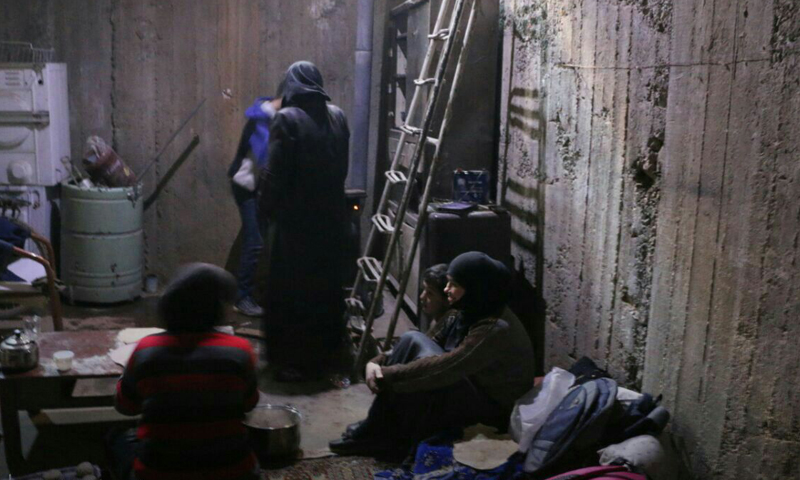



Zayd’s mother publishes her child’s photos on “Facebook,” showing him while drawing his dreams in the shelter where he is hiding; small and simple dreams summarized by his drawings that took the shape of a building where his family can live, with let windows and no shelling.
Zayd is a child who wants to be an architect in the future. Inside the basement, he drew his dream and drew a city that he wants to exist; grand cities and buildings with many floors. He let the windows, placed the people at the balconies to have a night under moonlight; he offered them all types of food he is denied.
#Save_Zayd
#Save_Ghouta
#Save_Children
The basic life’s needs, for those living in shelters and escaping the shelling on Eastern Ghouta, have turned into dreams, where more than 300 people were killed and the rest, the so called alive, are not able to see the sun, since last Sunday, for they chose basements as a sanctuary that might protect them from the fireballs with which military aircrafts and launchers are attacking their neighborhoods.
The story began with hundreds of families fleeing the areas close to the fighting fronts to cities and towns, which they thought of as more secure. However, the campaign which Assad’s forces and allies have triggered did not target the fire lines, as much as they have been attacking residential and inhabited areas, Saqba, Beit Sawa, Kafr Batna, Hamouriyah, Duma, Arbin and many others, to an extent that many people started saying that living on the fronts is less dangerous.
For the fifth day in a row, the campaign persists forcing the people to hide from the shelling under the ground, in conditions that are beyond imagination in their viciousness, according to Mouna’s, a woman living in Saqba, story which she told to Enab Baladi, on 22 February.
The cases of fainting and shortness f breath started to increase and food supplies in the people’s kitchens are running out, for the basements are swelling with escapees and the days are only counting.
Mouna says that the people with the chronic diseases are suffering a lot because they have run out of medicines and it is difficult to take them to medical centers, the most of which have been leveled to the ground by aircrafts.
“Doctors Without Borders” Organization stated that 13 hospitals have been destroyed in the shelling, warning of the area’s running out of medications after Assad’s forces have prevented the entry of medical and food related supplies.
An air raid targeted a shelter and killed at least five civilians in the town of Hamouriyah, located in the central part of Eastern Ghouta.
This air raid was not the first of its kind, in the sense of targeting shelters, for 55 civilians, including 40 children and woman at least, have been killed in the town of Beit Sawa, last Sunday.
In Saqba and Kafr Batna the death toll, due to the air raids that targeted the shelters there, reached 46 civilians.
Enab Baladi’s reporter in Eastern Ghouta said that the Civil Defense Teams, in the city of Saqba, succeeded in saving 30 people, including children and women, who were stuck under the rubble.
The campaign is launched by the Syrian and Russian military aircrafts, as well as artillery emplacements surrounding Ghouta that has been besieged for four years.
Through the Kremlin’s spokesperson, Dmitry Peskov, Russia denied its involvement in massacres against civilians in the area, considering the United Nations’ and the American accusations as groundless.
On “Twitter,” the Syrian opposition called for finding a solution to solve the Ghouta crisis. Naser al-Harir, the Head of the High Negotiations Committee, said that the solution lies in the implementation of the international laws, which provide for an immediate cession of aerial shelling and heading to the negotiations’ table, as will as achieving a full political transition.
Nevertheless, Staffan de Mistura, UN Special Envoy for Syria, describes the talks addressing the declaration of a truce in Ghouta as “difficult.”
Statements by politicians and the tweets of the “Twitter” users are imprisoned on social media platforms and TV screens, unseen by more than 300 thousand people living in Ghouta due to lacking electricity and internet, in addition to the fact that the shelters are not provided with such privileges, not to mention life’s basic needs.
if you think the article contain wrong information or you have additional details Send Correction